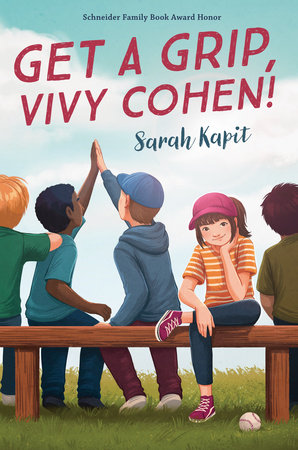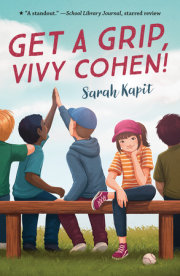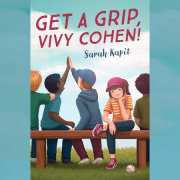February 10
Dear Vincent James Capello,
Hi! I’m Vivian Jane Cohen—VJC, just like you. That’s a sign of a connection between us, isn’t it? I think so. But I don’t go by VJ like you do. People just call me Vivy.
Well, that’s not really important. The really important thing is this: I want to be a knuckleball pitcher when I grow up. Just like you. My mom says that’s impossible because there’s never been a girl in the major leagues. Still, someone has to be first, right? And I’d like it to be me.
I don’t know if it’s actually possible, but my brother, Nate, says I throw a wicked knuckleball. He’s on the varsity team as a catcher even though he’s only a freshman in high school! That’s really impressive, don’t you think? So if Nate says my knuckleball is good, then it must be at least a little bit true.
The problem is, I’ve never pitched in a real game. I don’t play for a team. And I don’t know if I ever will.
But that’s not a very happy subject to write about, and I want this letter to be happy. So now I’m going to talk about something else.
I bet you’re wondering why I’m writing to you, out of all the bajillions of people in the world. Well, besides your general awesomeness, we actually know each other. Sort of. I met you three years ago, when you were still pitching in the minors. You probably don’t remember, but for me, well, it was the most important day ever!
Here’s what happened. My family and I went to a California Tornados game for this social thingy with the Autism Foundation. I didn’t like the game—loud and boring, which means, not for me. The seat felt so sticky against my skin. I bounced up and down even though Mom kept telling me, “Sit still, Vivy!”
Then we went into the clubhouse to meet the players.
You weren’t like the others. They talked to us in loud voices, which was pretty stupid because being autistic doesn’t mean you can’t hear anything. They used that funny voice teachers do sometimes, the one that needs to explaaain thiinnggs veeeeerrry sloooowllly. Not you.
You saw me wandering around in the back corner and came up to me with a big smile on your face. You tried talking to me, but I don’t talk to strangers.
I fought very, very hard against the urge to run. I wanted so much to get back to my own room, away from all the strangers and their big voices and stinky armpits.
That’s when you pulled out a baseball and showed me your knuckleball grip—four fingers clenched into a fist.
“The knuckleball is a very special pitch,” you said. “It completely defies the laws of physics because it doesn’t spin in the air like other pitches. Try it.”
I didn’t understand much about physics and stuff, but I liked the idea of throwing a super-special pitch. Except I didn’t think it would be a very good idea to throw a baseball with all those people right there. “Now?” I asked.
You laughed. “Not in the clubhouse! But when you get home, will you give it a try?”
“Yes,” I said.
You smiled. “I think you’ll like it.”
When I went home that night, I tried throwing the knuckleball for real. The first two pitches bounced into the grass. Then the third pitch sailed right over the backyard fence, so I lost the ball forever. Nate got really mad at me, because I borrowed it from him without asking. Oops. After that I asked Mom and Dad for my very own baseball. Even though it was hard, I knew I wanted to learn the pitch that defies the laws of physics. Your pitch.
Every day since then, I’ve practiced throwing the knuckleball. I’m not sure how many days that is, but it must be an awful lot. I can also throw a two-seam fastball, though it isn’t exactly fast. But I guess no one says they throw a two-seam sort-of-but-not-really-fastball. Even if it is closer to the truth.
I wish so much I could pitch for a real team. Like in that movie where girls played baseball because all the boys were off fighting in World War II and stuff. But all that happened a really long time ago. In real life, girls don’t play baseball. Especially not autistic ones. I’ve asked about it a million and three times, but Mom keeps saying I should play softball instead. No matter how many times I explain everything to her, she doesn’t understand that it’s harder to throw a knuckleball with a great big softball.
And if I can’t throw the knuckleball, I don’t want to play.
I’m writing to you because I need to write a letter to someone for my social skills group and I chose you. My dad says it’s okay. He’s a big fan of yours too.
To be completely honest, I don’t understand the point of this assignment because everyone in the whole world uses email. DUH. But when I mentioned this fact to Sandra, the counselor who runs the group, she just let out a sound that sounded very not-nice to my ears. “Just do what you’re told, Vivy,” she said.
Adults sure like saying that, don’t they? And I want to be good, so I am doing what I’m told. Even though I don’t entirely understand why I’m doing it.
Oh, sorry. You’re probably not very interested in Sandra. Since you’re a super-famous pitcher and all. I mean, you’ve been an All-Star twice, plus you won the Cy Young Award! You probably don’t have time to read letters from eleven-year-old girls at all. But I wanted to try anyway. It took a really long time for me to find an address on the official team website. Someone should fix that, in my opinion. But I did find it and now I’m sending you a letter. Since we’ve met before, we’re not strangers.
Also, pitchers and catchers report to spring training today and I wanted to wish you good luck. Not that YOU of all people need luck, of course, but I figured you’re probably pretty down after what happened in the World Series last year. That must have been really hard. I know what it’s like to mess things up.
I wanted to tell you that even after what happened, you still have lots of fans like me who are rooting for you. My dad says it’s our year, and I think he’s right.
Sincerely, Vivian Jane Cohen, also known as Vivy
P.S. Do you know why the knuckleball is called a knuckleball when you don’t actually use your knuckles to throw it? Wouldn’t it make more sense to call it a fingertipball?
Copyright © 2020 by Sarah Kapit. All rights reserved. No part of this excerpt may be reproduced or reprinted without permission in writing from the publisher.







